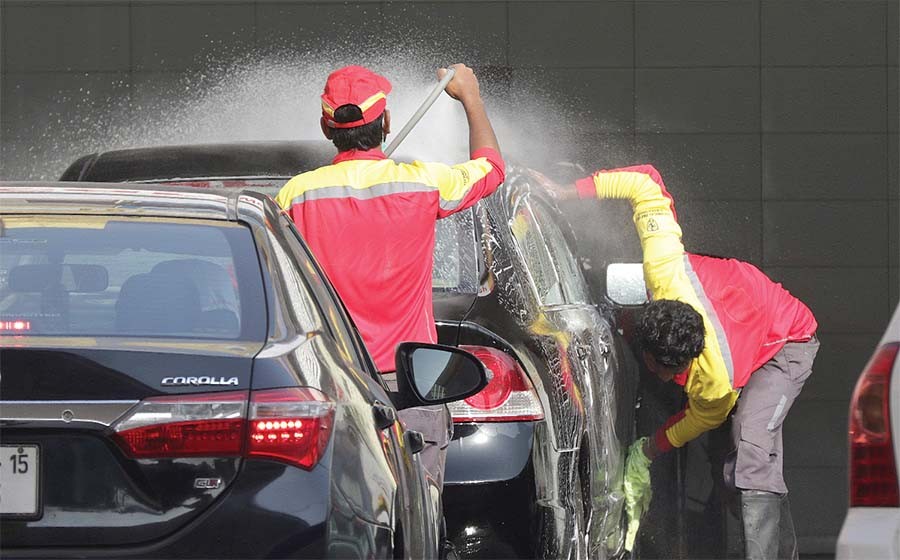
Huge amounts of clean, drinking water are wasted during car wash at service stations. The government is trying to check the practice

Car wash is an activity that negatively affects the environment primarily due to its excessive consumption of water and usage of cleaning agents as well as wastewater generation and emission.
WaterAid, a non-government organisation working on "clean water, decent toilets and good hygiene," has compiled a data that shows 22 million people in Pakistan still have no choice but to drink dirty water. Car wash service stations are consuming drinking water, which is a cause for serious concern. In order to help the situation, the government launched a campaign in November last year when the Lahore High Court (LHC) directed the Water and Sanitation Agency, Lahore (WASA) and Lahore Development Authority (LDA) to clamp down on service stations that provide car wash without having a proper water recycling system in place.
Technically, a car wash water recycling system comprises a)oil sludge removal, b)multimedia filteration, c)activated carbon filtration, and d)water softener.
At first, Wasa shut down 280 service stations that were pumping water illegally, and fined them Rs10,000 each. Later, the agency set a deadline for March 31 for all the remaining car wash facilities in the city to install recycling plants, else face shutdown.
According to Wasa, 550 service stations are still operating, of which 270 use bore water and the rest utilise Wasa’s commercial supply connections -- all of them are consuming potable water.
Nadeem Ahmad, Policy and Advocacy Manager at WaterAid, says that installing recycling plants is the easiest and most viable solution for service stations because "it depends more on recycled water and consumes less clean water.
"This way, we can also save on electricity and fuel," he adds.
A United Nations Development Programme (UNDP) data shows that the per-day-per-station average of cars being washed in Lahore is 38, with an approximate consumption of 130 litres per car. Hence, the 20,900 cars being washed in 550 service stations in Lahore means per-day consumption of 2.72 million litres; 81,510,000 litres per month, and 978,120,000 per year.
Reportedly, the UNDP helped to install three recycling plants in Islamabad. The installation has been a success and now UNDP is willing to invest in a similar project in Lahore.
Assistant Country Director and Chief Development Policy Unit at UNDP, Shakeel Ahmed tells TNS that service stations with recycling equipment consume much less water compared to a standard car wash. "On average, each one of us consumes 150 litres per day for drinking, bathing, and other purposes. If the service stations install car wash water recycling plants, each station would be able to save up to 1.8 million litres of water in a year. This amounts to water wastage reduction of 70 to 80 percent. Recycling water at one service station alone could help to save water that can be used for up to 27 days by a single person."
He adds, "The total cost of an efficient recycling plant is not more than Rs500,000, which means a service station needs Rs15,000 to 20,000 as monthly operational cost. It’s quite an affordable one."
The criminal ‘misuse’ of water at most service stations leads to a drop in groundwater table, besides causing water pollution as it drains the chemically contaminated water in sewerage lines. Considering the gravity of the situation, Wasa Lahore recently sent notices to the concerned owners of service stations, instructing them to install recycling plants. The desired results haven’t been achieved yet.
Imtiaz Mujtaba, Spokesperson, Wasa, believes that even though the investment needed for installation of the said equipment is not too big, the owners are reluctant to invest. Hence, the agency "instructed the district management to take action against all service stations that have not complied."
Wasa has no record of the number of service stations that have followed the directive, Mujtaba says. The one in Chuna Mandi is an exception. Its owner, Musa Khan, when contacted, was reluctant to share details of the cost of equipment and any related expenses. But he commended it as an affordable and productive system.
"People in our area and those with whom I am in contact are not keen on [installing] the recycling plant," he adds. "They don’t wish to invest their own money, and would rather the government provides them with funds or subsidy for that."
Nadeem Ahmad suggests that the government should offer small loans with low interest rates, and there should be a complete ban on pumping clean water.
"In the absence of any legislation and regulations, the district government has the right to intervene, but nothing is being done in this regard. Ironically, although a permit is required to dig out sand, there are no restrictions on pumping underground drinking water for industrial usage."
For Shakeel Ahmed, it is important that "the government institutions be sensitised on the issue. Although, there is no imminent threat of water scarcity in Europe, each of their country has got water management policies in place, and continue to develop modern techniques to save water."
In Pakistan, the discussion still centres round building reservoirs which are certainly a necessity but no attention is being paid to the methods that must be adopted in order to save and reuse water. Both Nadeem and Shakeel are convinced that codes and guidelines will have to be laid out for service stations. These should address the key areas providing real solutions that minimise consumption and waste streams in car washing.
For instance, car wash operators should adopt the proper treatment of water that in compliance with the standards of discharge (both in sewerage and the environment). For low pressure sprinklers that have minimum water consumption and provide high grade wash, a low pressure flow is recommended. Secondly, regular revisions and water leakage repair systems should be put in order. Only the use of approved chemicals, which are either treatable or completely biodegradable, should be permitted in commercial car washes.